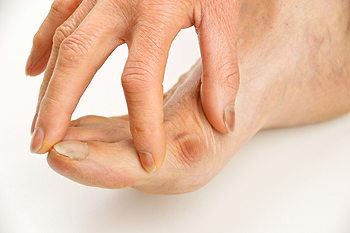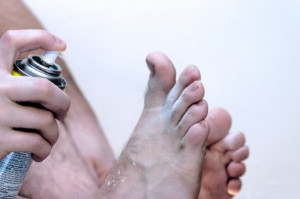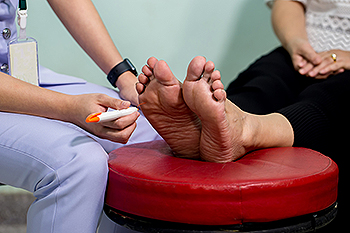December 2021
Ways to Reduce Foot Problems for Diabetics
Most people associate diabetes with blood sugar and insulin levels, but many diabetics are also at risk for severe foot problems. Over time diabetes may cause nerve damage and this is commonly referred to as diabetic neuropathy. This condition can cause numbness, tingling, and pain in the feet. Once this develops you might not notice a cut or sore on the foot which could lead to an infection. Diabetes can also reduce blood flow to the feet making it even more difficult for a cut or infection to heal. Without treatment an infection may lead to gangrene, and in severe cases amputation of a toe or foot could be necessary. If you have diabetes there are ways to keep your feet healthy: inspect your feet every day for cuts, sores, scrapes, or any other changes; wash and dry your feet thoroughly; trim toenails straight across and not too short; wear socks and shoes that fit correctly; and elevate your feet while you are sitting. If you have foot wounds that won't heal, notice an odor coming from your feet, or see changes to the color or shape of your feet, it is strongly suggested that you seek the care of a podiatrist as soon as possible.
Diabetic foot care is important in preventing foot ailments such as ulcers. If you are suffering from diabetes or have any other concerns about your feet, contact the podiatrists from New England Family Foot Care. Our doctors can provide the care you need to keep you pain-free and on your feet.
Diabetic Foot Care
Diabetes affects millions of people every year. The condition can damage blood vessels in many parts of the body, especially the feet. Because of this, taking care of your feet is essential if you have diabetes, and having a podiatrist help monitor your foot health is highly recommended.
The Importance of Caring for Your Feet
- Routinely inspect your feet for bruises or sores.
- Wear socks that fit your feet comfortably.
- Wear comfortable shoes that provide adequate support.
Patients with diabetes should have their doctor monitor their blood levels, as blood sugar levels play such a huge role in diabetic care. Monitoring these levels on a regular basis is highly advised.
It is always best to inform your healthcare professional of any concerns you may have regarding your feet, especially for diabetic patients. Early treatment and routine foot examinations are keys to maintaining proper health, especially because severe complications can arise if proper treatment is not applied.
If you have any questions please feel free to contact our office located in Milton, MA . We offer the newest diagnostic and treatment technologies for all your foot and ankle needs.
How Bunions Form
 Bunions are a common foot deformity known as a small, bony lump on the side of the big toe. This bony protrusion usually forms due to the big toe bending towards the smaller toes when it should be straight, thus pushing the bones out of alignment. Bunions gradually form over time and typically get worse without treatment. The angle of the bunion gets sharper, and the bump can grow larger. In severe cases, surgery may be necessary. Bunions may be the result of an inherited mechanical structure, or they may form from wearing shoes that are too tight. Common symptoms of a bunion include pain in the affected area, inflammation, a burning sensation, and possible numbness. It is suggested that larger shoes, or shoes with a wide toe box be worn when you are afflicted with a bunion. Patients who are struggling with this ailment should consult with a podiatrist as soon as possible to determine the best course of treatment.
Bunions are a common foot deformity known as a small, bony lump on the side of the big toe. This bony protrusion usually forms due to the big toe bending towards the smaller toes when it should be straight, thus pushing the bones out of alignment. Bunions gradually form over time and typically get worse without treatment. The angle of the bunion gets sharper, and the bump can grow larger. In severe cases, surgery may be necessary. Bunions may be the result of an inherited mechanical structure, or they may form from wearing shoes that are too tight. Common symptoms of a bunion include pain in the affected area, inflammation, a burning sensation, and possible numbness. It is suggested that larger shoes, or shoes with a wide toe box be worn when you are afflicted with a bunion. Patients who are struggling with this ailment should consult with a podiatrist as soon as possible to determine the best course of treatment.
If you are suffering from bunions, contact the podiatrists of New England Family Foot Care. Our doctors can provide the care you need to keep you pain-free and on your feet.
What Is a Bunion?
A bunion is formed of swollen tissue or an enlargement of boney growth, usually located at the base joint of the toe that connects to the foot. The swelling occurs due to the bones in the big toe shifting inward, which impacts the other toes of the foot. This causes the area around the base of the big toe to become inflamed and painful.
Why Do Bunions Form?
Genetics – Susceptibility to bunions are often hereditary
Stress on the feet – Poorly fitted and uncomfortable footwear that places stress on feet, such as heels, can worsen existing bunions
How Are Bunions Diagnosed?
Doctors often perform two tests – blood tests and x-rays – when trying to diagnose bunions, especially in the early stages of development. Blood tests help determine if the foot pain is being caused by something else, such as arthritis, while x-rays provide a clear picture of your bone structure to your doctor.
How Are Bunions Treated?
- Refrain from wearing heels or similar shoes that cause discomfort
- Select wider shoes that can provide more comfort and reduce pain
- Anti-inflammatory and pain management drugs
- Orthotics or foot inserts
- Surgery
If you have any questions, please feel free to contact our office located in Milton, MA . We offer the newest diagnostic and treatment technologies for all your foot care needs.
Do You Have Athlete’s Foot?
 If you notice a rash on the skin of your feet, mainly between the toes, that is red, itchy, scaly or dry, it may be a sign of a fungal infection known as athlete’s foot. Athlete’s foot can cause other symptoms such as a foul odor, cracked and peeling skin, and a burning sensation. The fungi that cause athlete’s foot often thrive in warm and moist environments which means that it often spreads in areas such as communal showers or public pools. Other ways athlete’s foot can spread include sharing items that touch the feet, as well as touching the infected area directly. Patients who believe that they may have athlete’s foot should consult with a podiatrist for treatment in order to clear the infection and prevent it from spreading.
If you notice a rash on the skin of your feet, mainly between the toes, that is red, itchy, scaly or dry, it may be a sign of a fungal infection known as athlete’s foot. Athlete’s foot can cause other symptoms such as a foul odor, cracked and peeling skin, and a burning sensation. The fungi that cause athlete’s foot often thrive in warm and moist environments which means that it often spreads in areas such as communal showers or public pools. Other ways athlete’s foot can spread include sharing items that touch the feet, as well as touching the infected area directly. Patients who believe that they may have athlete’s foot should consult with a podiatrist for treatment in order to clear the infection and prevent it from spreading.
Athlete’s foot is an inconvenient condition that can be easily reduced with the proper treatment. If you have any concerns about your feet and ankles, contact the podiatrists from New England Family Foot Care. Our doctors will treat your foot and ankle needs.
Athlete’s Foot: The Sole Story
Athlete's foot, also known as tinea pedis, can be an extremely contagious foot infection. It is commonly contracted in public changing areas and bathrooms, dormitory style living quarters, around locker rooms and public swimming pools, or anywhere your feet often come into contact with other people.
Solutions to Combat Athlete’s Foot
- Hydrate your feet by using lotion
- Exfoliate
- Buff off nails
- Use of anti-fungal products
- Examine your feet and visit your doctor if any suspicious blisters or cuts develop
Athlete’s foot can cause many irritating symptoms such as dry and flaking skin, itching, and redness. Some more severe symptoms can include bleeding and cracked skin, intense itching and burning, and even pain when walking. In the worst cases, Athlete’s foot can cause blistering as well. Speak to your podiatrist for a better understanding of the different causes of Athlete’s foot, as well as help in determining which treatment options are best for you.
If you have any questions please feel free to contact our office located in Milton, MA . We offer the newest diagnostic and treatment technologies for all your foot and ankle needs.
Reminder: When Was the Last Time...?
Tired of Getting Cold Feet?
 Cold feet, generally caused by poor blood flow, often increases as we age. Causes can be linked to having a more sedentary lifestyle, obesity, diabetes and smoking. But the sensation of cold feet, while annoying, can also indicate much more serious conditions, such as Deep Vein Thrombosis, or blood clots; hardening of the arteries, or atherosclerosis. These conditions can be life threatening and should not be overlooked. Some ways you can improve circulation to the feet include lowering blood pressure with a healthy diet, getting more exercise, and keeping your feet elevated by using a recliner. If symptoms of cold feet persist, please consult a podiatrist to find out more information on treatment methods.
Cold feet, generally caused by poor blood flow, often increases as we age. Causes can be linked to having a more sedentary lifestyle, obesity, diabetes and smoking. But the sensation of cold feet, while annoying, can also indicate much more serious conditions, such as Deep Vein Thrombosis, or blood clots; hardening of the arteries, or atherosclerosis. These conditions can be life threatening and should not be overlooked. Some ways you can improve circulation to the feet include lowering blood pressure with a healthy diet, getting more exercise, and keeping your feet elevated by using a recliner. If symptoms of cold feet persist, please consult a podiatrist to find out more information on treatment methods.
Poor circulation is a serious condition and needs immediate medical attention. If you have any concerns with poor circulation in your feet contact the podiatrists of New England Family Foot Care. Our doctors will treat your foot and ankle needs.
Poor Circulation in the Feet
Poor blood circulation in the feet and legs is can be caused by peripheral artery disease (PAD), which is the result of a buildup of plaque in the arteries.
Plaque buildup or atherosclerosis results from excess calcium and cholesterol in the bloodstream. This can restrict the amount of blood which can flow through the arteries. Poor blood circulation in the feet and legs are sometimes caused by inflammation in the blood vessels, known as vasculitis.
Causes
Lack of oxygen and oxygen from poor blood circulation restricts muscle growth and development. It can also cause:
- Muscle pain, stiffness, or weakness
- Numbness or cramping in the legs
- Skin discoloration
- Slower nail & hair growth
- Erectile dysfunction
Those who have diabetes or smoke are at greatest risk for poor circulation, as are those who are over 50. If you have poor circulation in the feet and legs it may be caused by PAD and is important to make changes to your lifestyle in order to reduce risk of getting a heart attack or stroke. Exercise and maintaining a healthy lifestyle will dramatically improve conditions.
As always, see a podiatrist as he or she will assist in finding a regimen that suits you. A podiatrist can also prescribe you any needed medication.
If you have any questions please feel free to contact our office located in Milton, MA . We offer the newest diagnostic and treatment technologies for all your foot and ankle needs.










